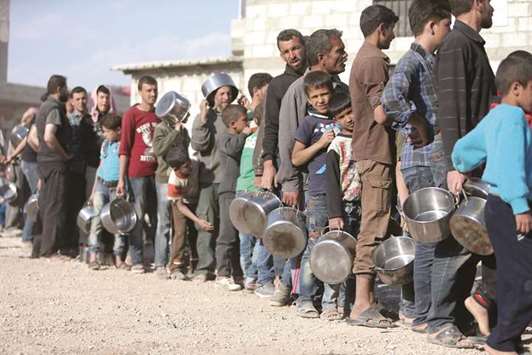In a telephone conversation with his Iranian counterpart Hassan Rouhani, Putin and Rouhani agreed that the Western strikes had damaged the chances of achieving a political resolution in the seven-year Syria conflict, according to a Kremlin statement.
“Vladimir Putin, in particular, stressed that if such actions committed in violation of the UN Charter continue, then it will inevitably lead to chaos in international relations,” the Kremlin statement said.
Meanwhile, US ambassador to the United Nations, Nikki Haley, told CBS’ “Face the Nation” programme that the United States would announce new economic sanctions today aimed at companies “that were dealing with equipment” related to Syrian President Bashar al-Assad’s alleged chemical weapons use.
On Saturday, the United States, France and Britain launched 105 missiles targeting what the Pentagon said were three chemical weapons facilities in Syria in retaliation for a suspected poison gas attack in Douma on April 7.
The Western countries blame Assad for the Douma attack that killed dozens of people.
The Syrian government and its ally Russia have denied involvement in any such attack. The bombings marked the biggest intervention by Western countries against Assad and ally Russia but the United States, France and Britain have said the missile strikes were limited to Syria’s chemical weapons capabilities and not aimed at toppling Assad or intervening in the civil war.
Responding to Haley’s remarks about the plans for new sanctions, Evgeny Serebrennikov, deputy head of the defence committee of Russia’s upper house of parliament, said Moscow was ready for the penalties, according to RIA news agency.
“They are hard for us, but will do more damage to the USA and Europe,” RIA quoted Serebrennikov as saying.
In Damascus, Syria’s deputy foreign minister, Faisal Mekdad, met inspectors from the global chemical weapons watchdog OPCW for about three hours in the presence of Russian officers and a senior Syrian security official.
The inspectors were due to attempt to visit the Douma site. Moscow condemned the Western states for refusing to wait for OPCW’s findings before attacking.
Mekdad declined to comment to reporters waiting outside the hotel where the meeting took place.
Assad told a group of visiting Russian lawmakers that the Western missile strikes were an act of aggression, Russian news agencies reported.
Syria released video of the wreckage of a bombed-out research lab, but also of Assad arriving at work as usual, with the caption “morning of resilience” and there were no immediate reports of casualties.
Russian agencies quoted the lawmakers as saying that Assad was in a “good mood”, had praised the Soviet-era air defence systems Syria used to repel the Western attacks and had accepted an invitation to visit Russia at an unspecified time.
Trump had said “mission accomplished” on Twitter after the strikes, though US Lieutenant General Kenneth McKenzie at the Pentagon acknowledged elements of the programme remain and he could not guarantee that Syria would be unable to conduct a chemical attack in the future.
Russian and Iranian military help over the past three years has allowed Assad to crush the rebel threat to topple him.
Though Israel has at times urged stronger US involvement against Assad and his Iranian and Lebanese Hezbollah reinforcements in Syria, it voiced backing for Saturday’s air strikes by Western powers.
“Israel fully supports President Trump’s decision to act against the use of chemical weapons in Syria,” Israel’s Prime Minister Benjamin Netanyahu told his cabinet in broadcast remarks on Sunday, adding that he had commended his British counterpart, Theresa May, in a phone call.
France, the United States and Britain circulated a draft resolution to UN Security Council late on Saturday that aims to establish a new independent inquiry into who is to responsible for chemical weapons attacks in Syria.
The mechanism would look at cases where the OPCW fact-finding mission has established chemical weapons were used or likely used.
Diplomats said negotiations on the draft resolution would begin today and it was not immediately clear when the United States, France and Britain wanted to put it to a vote.
Kurz seeks resumption of peace talks in Vienna
Austrian Chancellor Sebastian Kurz has called for a resumption of Syrian peace talks, which took place in Vienna in 2015, to halt the bloodshed in the devastated country. Kurz said no military solution appeared possible in the conflict which had already caused massive suffering for the Syrian people. “After the shocking use of chemical weapons on April 7 and the recent Western military action in Syria, it is now the order of the day to remember reason and to press ahead with the diplomatic peace process with all necessary vigour,” Kurz said in a statement yesterday. “The Syrian population had already suffered too much with over 400,000 deaths and over 5mn refugees outside Syria.”
Kurz said there could be no military solution to the conflict and therefore appealed “to all responsible actors” to continue the peace talks of the ‘International Syria Support Group’ took place between 20 different groups in Vienna in 2015.
A further escalation of the Syrian “proxy war” or even a direct military conflict between the US and Russia must be prevented by all means, Kurz added in a statement received by Reuters.
Austria has a long tradition as a place of dialogue and a bridge builder in conflicts, most recently in the Iranian nuclear deal, he said, with Austria ready to host talks over Syria at any time.
Since Kurz, a conservative, formed a coalition government with the far-right and pro-Putin Freedom Party in December, Austria had repeatedly said it wants to serve as a “bridge-builder” between east and west.

